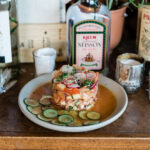It’s understandable to feel pressured to earn God’s favor through food and exercise, especially with today’s culture emphasizing weight loss and extreme fitness. Some Christian resources inadvertently link our spiritual worth to our food choices or body size, which can be discouraging. While not all Christian materials do this, it highlights how deeply diet culture has permeated our thinking.
 A motivational quote reminding Christians that their purpose is greater than fixating on diet and body image, emphasizing faith and spiritual growth over food obsession, aligning with biblical teachings on priorities.
A motivational quote reminding Christians that their purpose is greater than fixating on diet and body image, emphasizing faith and spiritual growth over food obsession, aligning with biblical teachings on priorities.
Before diving deeper, consider this: Does God truly focus on the amount of fat on our bodies? It’s more likely He cares about our hearts and how we manage the gifts, resources, and time He’s given us. Misusing God’s gifts is possible regardless of body size. This exploration aims to offer a fresh perspective, grounded in biblical truth, on eating and its place in our faith. It’s crucial to remember that everyone interprets the Bible personally, and this is not intended to replace professional guidance or individual relationships with God. Let’s examine what the Bible says about food, touching on idolatry and freedom, as excessive focus on food and body image can indeed become a form of bondage.
Our Bodies as Temples, Not Idols
Do you not know that your bodies are temples of the Holy Spirit, who is in you, whom you have received from God? You are not your own; you were bought at a price. Therefore honor God with your bodies.
1 Corinthians 6:19-20 (NIV)
Body worship has become so normalized that we often don’t recognize it. In an uncertain world, it’s natural to want to protect our bodies. We try to shield ourselves from perceived dangers and the effects of time. However, time progresses, and our bodies will age, regardless of our dietary habits. Instead of relying on our own strength to maintain a perfect physique, we should remember that our bodies are gifts from a loving God. Jesus’ sacrifice reflects His immense love for us. Shifting from body worship to body care, or even body acceptance, can be a transformative process. This shift honors God by allowing us to focus on deeper aspects of life, including our relationship with Him.
For many, caring for their body might include:
- Observing a Sabbath day for rest.
- Eating for both nourishment and enjoyment daily.
- Engaging in physical activity that feels empowering, adapting to life’s demands.
- Placing body image in its proper perspective, not at the center of life.
Freedom from Food Idolatry
No temptation[a] has overtaken you except what is common to mankind. And God is faithful; he will not let you be tempted[b] beyond what you can bear. But when you are tempted,[c] he will also provide a way out so that you can endure it.
Therefore, my dear friends, flee from idolatry.1 Corinthians 10:13-14 (NIV)
Idolatry occurs when we prioritize anything above God, making it the focal point of our devotion and pursuit. It’s insidious because it can manifest in seemingly positive forms. Food and exercise can become idols, diverting us from our relationship with God. They are deceptive, promising a security and fulfillment they can never deliver. For many, fixating on body size and food choices can consume mental energy and create anxiety, hindering a life lived according to deeper values.
No Condemnation in Christ Regarding Food
Therefore, there is now no condemnation for those who are in Christ Jesus, because through Christ Jesus the law of the Spirit who gives life has set you[a] free from the law of sin and death.
Romans 8:1-2 (NIV)
Shame about food is not divinely inspired. God created hunger as a natural signal, intending for us to eat for sustenance. The Bible doesn’t prescribe specific diets but suggests an approach to eating that minimizes mental preoccupation. This involves enjoying a variety of nourishing and pleasurable foods, eating what is available and appealing, and then moving forward without excessive thought. If feelings of shame arise after eating, consider exploring these feelings with curiosity rather than self-judgment. Ask, “Why am I feeling this? Where does this feeling originate? Can I acknowledge it and release it, knowing it doesn’t come from God?”
Heart Condition Over Dietary Rules
Clearly no one who relies on the law is justified before God, because “the righteous will live by faith.”
Galatians 3:11 (NIV)
This is not an excuse for unbridled indulgence or sin. It emphasizes that outward religious actions, without genuine inner transformation, do not deepen our relationship with God. Similarly, adhering to strict diets or exercise regimens solely to “be healthy” or “get in shape,” driven by a need to earn love or cope with challenges, does not glorify God. It can be a form of self-deception.
Dallas Willard’s quote offers insight: “Grace is not opposed to effort. It is opposed to earning.” Spiritual practices and health-promoting behaviors are valuable, but their worth is determined by our heart’s condition.
Consider these contrasting examples, both involving the same actions but differing in intention—striving in self-reliance versus trusting in God’s grace:
Waking up early to pray out of fear that God’s love is conditional on it? Striving.
Waking up early to pray because it fosters peace with oneself and God? Trusting.
Going for a run out of obligation, despite feeling unwell or as compensation for overeating? Striving.
Going for a run because it is enjoyable, regardless of body shape changes? Trusting.
All Food is Good and from God
Eat anything sold in the market without raising questions of conscience, for, “The earth is the Lord’s, and everything in it.”
1 Corinthians 10:25-26 (NIV)
God created food as a blessing, inherently good for us to enjoy. The Bible permits eating all foods without questioning their inherent goodness. While dietary restrictions existed in the past, often related to sacrifices, Jesus’ ultimate sacrifice removed the need for these food-based rituals. (This perspective respects vegetarianism/veganism as personal choices, while acknowledging that for some, restrictive diets can become another form of obsession.)
Nothing outside a person can defile them by going into them. Rather, it is what comes out of a person that defiles them.
Mark 7:15 (NIV)
Our spiritual well-being isn’t determined by what we consume, but by the intentions and attitudes of our hearts. Our inner state, our sinful nature, is the real concern, requiring God’s saving grace.
Navigating faith and food involves nuance. If body image and food choices dominate your self-perception, they might be hindering your relationship with God. This observation comes from a place of empathy, having experienced a similar struggle. Recognizing our identity in Christ is key to breaking free from disordered eating patterns. Recovery is often a continuous journey.
Do you have further questions about faith and eating? Your inquiries are welcome.



